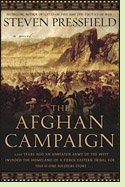The Afghan Campaign
by Steven Pressfield
Reviewed by David Maclaine

The Afghan Campaign treats the hardest military challenge ever faced by Alexander the Great from the standpoint of the men who marched off to fight with him. The title, which chooses a modern name for a war in lands then called Bactria and Sogdiana, makes clear from the outset the parallels the author sees between a war fought in the fourth century B.C. and another fought some twenty-four centuries later. The novel is one of many admirable works showing a naïve young recruit marching off in hope of glory only to find his soul slowly destroyed by the horrors of combat: atrocities witnessed, endured and committed. In this case the novice soldier is a Macedonian who arrives as Alexander begins his efforts to subdue the still-rebellious northwestern provinces of the Persian Empire.
During The Afghan Campaign the protagonist must learn to kill and survive in the face of ever-present death. He must also master hard lessons about unconventional warfare that persist across the centuries. Here are the struggles in a deadly landscape better known to the natives than to the invaders, the prospect of betrayal by "friendly" civilians, the savage treatment of soldiers who fall into enemy hands, and the frustration of facing an enemy who melts into hiding only to return when least expected. Here too are the unbridgeable gaps between cultures, as relations with native women are fatally compromised by bewildering tribal codes of "honor." Those who would like to pretend the past has nothing to teach us about the present should remember that the mountains and valleys where the Macedonians fought and died are still there today, shaping both the people who live there and the kind of war invaders must wage. So too is one of the cities founded by Alexander and named after him during those challenging years, though the name has been slightly modified to fit the local tongue. In today's headlines we know it as Kandahar. (2006, 351 pages)
More about The Afghan Campaign at Powell's Books, Amazon.comThe Afghan Campaign appears on the list of The 36 Best Historical Novels for a Survey of Ancient Greek History
Other novels about Alexander the Great:
The Virtues of War by Steven Pressfield (1972), about the early years and military victories of Alexander the Great; #1 in Pressfield's series about Alexander. See review or more info at Powell's Books
Alexander: God of War by Christian Cameron (2012). See review or more info at The Book Depository
The Persian Boy by Mary Renault (1972), about Alexander the Great from the perspective of a Persian youth who became his lover after Alexander's conquest of Persia; #2 in Renault's Alexander trilogy. See review or more info at Powell's Books
Nonfiction about Alexander the Great:
The Life of Alexander the Great by Plutarch (probably written in the late first century). More info
Alexander the Great by Philip Freeman (2011). More info
Alexander the Great by Robin Lane Fox (1974). More info
At the Movies:
Alexander, Revisited: The Final Cut
Online:
Alexander the Great at HistoryofMacedonia.org
Back to Novels of Ancient History
Back to Directory of Book Reviews